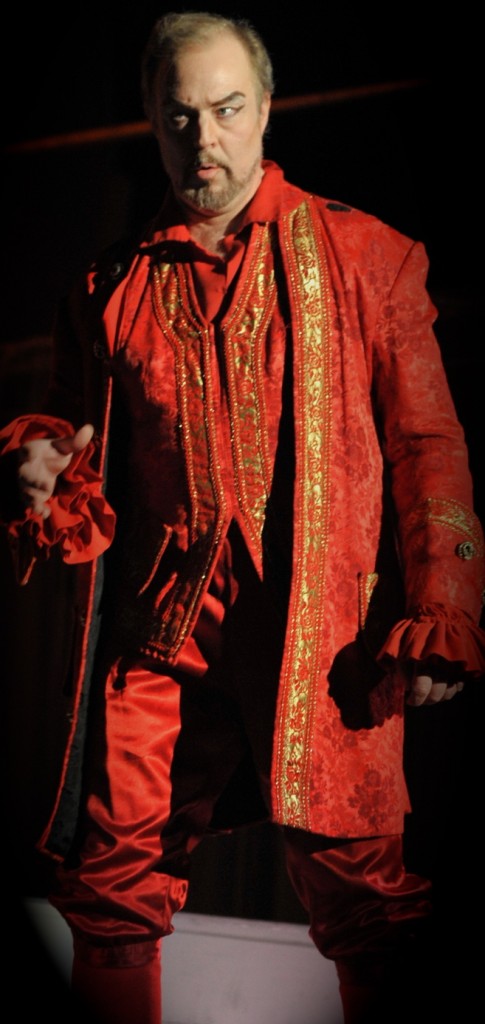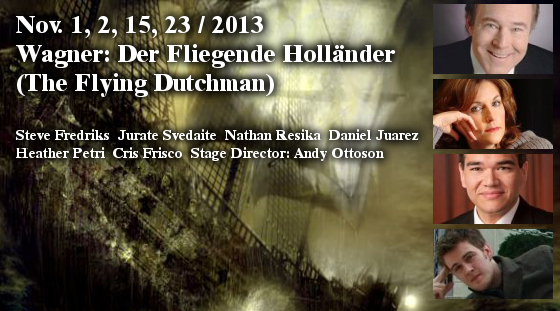Archival record of the past event
Wagner: DER FLIEGENDE HOLLÄNDER (The Flying Dutchman)
Fully staged opera with the CT Lyric Opera
Friday, Nov. 1 / 7:30 pm / Trinity-On-Main Arts Center / New Britain, CT
Saturday, Nov. 2 / 7:30 pm/ MHS Arts Center / Middletown, CT
Friday, Nov. 15 / 7 pm / Waterbury Palace Theater / Waterbury CT
Saturday, Nov. 23 / 8 pm / Garde Arts Center / New London, CT
Review from New London Day >>>
2013 CT Opera of the Year >>>
Richard Wagner Der Fliegende Holländer Overture (audio) >>>
Wagner-Flying Dutchman-Duet part 1 (audio) >>>
Cast:








The Dutchman, bass-baritone – Steve Fredericks
Senta, Daland’s daughter, soprano – Jurate Svedaite
Daland, a Norwegian sea captain – Nathan Resika
Erik, a huntsman, tenor – Daniel Juarez
Mary, Senta’s nurse, contalto – Heather Petri (Nov1, 15, 23) / Silvana Chu (Nov. 2)
Steersman, tenor – Cris Frisco
Connecticut Virtuosi Orchestra
Conductor: Adrian Sylveen
CLO Chorus
Chorus Master: Dara Backstone
Creative Team:
Stage Director: Andy Ottoson
Artistic Director: Adrian Sylveen
Technical Director: Tim O’connor
Set Design & Production: Tim O’connor, Chris Podkowiak, Katie Jurkiewicz
Production Manager: Matthew Burry
Costumes: Katie Jurkiewicz
 Hailed for his “robust” singing with “great emotional depth” Steve Fredericks has made his mark with some of opera’s most celebrated roles. Fredericks’ impressive repertory spans all styles and represents his versatility as a performer. From favorite Puccini roles, Colline and Timur, to the most heroic of Wagner’s characters, he continually explores all dimensions of his talents. Capable in title roles like Massenet’s Don Quichotte and Wagner’s Dutchman, he is no stranger to supporting roles, offering memorable portrayals of Verdi’s Lodovico in Otello, the King of Egypt (Aida) and the Bonze in Madama Butterfly. Notably, Fredericks created the role of Signorelli in the world premier of Louis Gioia’s Un Racconto Fiorentino at Alice Tully Hall, Lincoln Center. He also contributed to the premiere of Lee Hoiby’s The Tempest at the Dallas Opera singing the role of the ambitious evil nemesis, Antonio. Mr. Fredericks was heard as the bass soloist in Handel’s Messiah at Carnegie Hall, Strommenger in La Wally with Teatro Grattacielo at Allice Tully Hall conducted by Guido Ajmone-Marsan, Reinmar in Tannhäuser with The Baltimore Opera conducted by Christian Badea and Ferrando in Il Trovatore with Maestro Anton Coppola. He has frequently appeared with Maestro Vincent La Selva and the New York Grand Opera in Central Park, New York City. He sang the role of Filippo in a highlighted version of Don Carlo at the 1997 Opera America Convention in Philadelphia. Internationally, he has performed with The Chuvash State Theatre (Russia) as Sparafucile in Rigoletto, and the Herald in Lohengrin, Paris/Saone-et-Loire (France) where he also appeared as the bass soloist in the Beethoven 9th symphony.
Hailed for his “robust” singing with “great emotional depth” Steve Fredericks has made his mark with some of opera’s most celebrated roles. Fredericks’ impressive repertory spans all styles and represents his versatility as a performer. From favorite Puccini roles, Colline and Timur, to the most heroic of Wagner’s characters, he continually explores all dimensions of his talents. Capable in title roles like Massenet’s Don Quichotte and Wagner’s Dutchman, he is no stranger to supporting roles, offering memorable portrayals of Verdi’s Lodovico in Otello, the King of Egypt (Aida) and the Bonze in Madama Butterfly. Notably, Fredericks created the role of Signorelli in the world premier of Louis Gioia’s Un Racconto Fiorentino at Alice Tully Hall, Lincoln Center. He also contributed to the premiere of Lee Hoiby’s The Tempest at the Dallas Opera singing the role of the ambitious evil nemesis, Antonio. Mr. Fredericks was heard as the bass soloist in Handel’s Messiah at Carnegie Hall, Strommenger in La Wally with Teatro Grattacielo at Allice Tully Hall conducted by Guido Ajmone-Marsan, Reinmar in Tannhäuser with The Baltimore Opera conducted by Christian Badea and Ferrando in Il Trovatore with Maestro Anton Coppola. He has frequently appeared with Maestro Vincent La Selva and the New York Grand Opera in Central Park, New York City. He sang the role of Filippo in a highlighted version of Don Carlo at the 1997 Opera America Convention in Philadelphia. Internationally, he has performed with The Chuvash State Theatre (Russia) as Sparafucile in Rigoletto, and the Herald in Lohengrin, Paris/Saone-et-Loire (France) where he also appeared as the bass soloist in the Beethoven 9th symphony.
___________________________
Connecticut premiere of Richard Wagner’s opera The Flying Dutchman
 (by Mitra Sadigh)
(by Mitra Sadigh)Sea salt, stormy seas, ghost ships, gleaming treasures, cursed captains and redemption through love conquer the stage this November in the first ever Connecticut production of Der Fliegende Holländer (The Flying Dutchman), a co-production of CT Lyric Opera and the CT Virtuosi Chamber Orchestra. Fully staged, with soloists, full orchestra, and chorus led by Maestro Adrian Sylveen, this production is perhaps CT Lyric Opera’s grandest to date as the company has grown extensively since its inception eleven years ago, now enlivening stages throughout the state. Audiences are advised to hold on tight for a work whose wind, in conductor Franz Lachner’s words in 1864, “blows out at you wherever you open the score.”
Originating in 17th century nautical folklore, The Flying Dutchman is the tale of a phantom ship, omen of doom to all who encounter it, captained by a Dutchman cursed to an eternity at sea. From Thomas Moore’s poem On Passing Dead Man’s Island to the Hollywood hit Pirates of the Caribbean, the ghost ship and its captain haunt books, films, plays and animations. Wagner based his adaptation on Heinrich Heine’s retelling of the myth in a satirical 1834 novel The Memoirs of Mr. von Schnabelewopski (Aus den Memoiren des Herrn von Schnabelewopski) in which the Dutchman is permitted on land every seven years to find redemption through a faithful woman’s love. The opera tells the tale threefold: through famous text in the heroine’s ballad, striking stage action and effects, and dramatically shifting soundscapes—callously merciless, desperately pleading, tenderly forgiving.
Wagner’s own adventure at sea enlivens the opera’s score. Having accrued hefty debts from their extravagant lifestyle, Wagner and his wife Minna planned to escape creditors by fleeing Riga, debuting Wagner’s opera Rienzi at the Paris Opéra and making a fortune. When authorities seized Wagner’s passport, the determined couple ventured a perilous, illegal crossing over the Prussian border aboard Thetis, suffering dangerous storms and seeking refuge in Norwegian fjords. Wagner writes in Mein Leben that upon arrival at the safety of the fjord, “a feeling of indescribable content came over me as the enormous granite walls of the cliff echoed the chantings of the crew as they cast anchor … The sharp rhythm of their call … soon resolved itself into the theme of the sailors’ chorus in my Der Fliegende Holländer (The Flying Dutchman). The idea of this opera…took on a definite poetic and musical colour under the influence of the impressions I had just gained.”
The role of ever-devoted Senta is sung by Lithuanian soprano Jurate Svedaite, star of the CT Lyric Opera. Svedaite has performed throughout Europe and the United States with the Lithuanian National Chamber Orchestra, the European Baroque Festival Opera, CT Lyric Opera and New Britain Symphony in venues including Carnegie Hall, the Lithuanian National Opera and Ballet Theatre and Foxwood’s Resort and Casino. She has sung many star roles including Micaela in Carmen, Donna Anna in Don Giovanni, Desdemona in Otello, Mimi in La Bohème, and the title role in Tosca.
With landmark performances in Russia, Europe and the United States, Steven Fredericks stars as The Dutchman. He has appeared as bass soloist in Handel’s Messiah at Carnegie Hall, Strommenger in La Wally with Teatro Grattecielo at Allice Tully Hall, Reinmar in Tannhäuser, Ferrando in Il Trovatore, Bonze in Madame Butterfly, King of Egypt in Aida and Lodovico in Otello, among countless other roles. He has recently performed Zaccaria in Nabucco and the Commendatore in Don Giovanni with the CT Lyric Opera.
Wagner described The Flying Dutchman as a turning point in his career: “From here begins my career as poet, and my farewell to the mere concoctor of opera-texts.” The work demonstrates his early attempts at operatic styles that would later characterize his music dramas, including the accentuated dramatic role of the orchestra and the combination of music, song, orchestration, drama, text, visual arts and stagecraft into what he called Gesamtkunstwerk, or “total work of art.”








 Hailed for his “robust” singing with “great emotional depth” Steve Fredericks has made his mark with some of opera’s most celebrated roles. Fredericks’ impressive repertory spans all styles and represents his versatility as a performer. From favorite Puccini roles, Colline and Timur, to the most heroic of Wagner’s characters, he continually explores all dimensions of his talents. Capable in title roles like Massenet’s Don Quichotte and Wagner’s Dutchman, he is no stranger to supporting roles, offering memorable portrayals of Verdi’s Lodovico in Otello, the King of Egypt (Aida) and the Bonze in Madama Butterfly. Notably, Fredericks created the role of Signorelli in the world premier of Louis Gioia’s Un Racconto Fiorentino at Alice Tully Hall, Lincoln Center. He also contributed to the premiere of Lee Hoiby’s The Tempest at the Dallas Opera singing the role of the ambitious evil nemesis, Antonio. Mr. Fredericks was heard as the bass soloist in Handel’s Messiah at Carnegie Hall, Strommenger in La Wally with Teatro Grattacielo at Allice Tully Hall conducted by Guido Ajmone-Marsan, Reinmar in Tannhäuser with The Baltimore Opera conducted by Christian Badea and Ferrando in Il Trovatore with Maestro Anton Coppola. He has frequently appeared with Maestro Vincent La Selva and the New York Grand Opera in Central Park, New York City. He sang the role of Filippo in a highlighted version of Don Carlo at the 1997 Opera America Convention in Philadelphia. Internationally, he has performed with The Chuvash State Theatre (Russia) as Sparafucile in Rigoletto, and the Herald in Lohengrin, Paris/Saone-et-Loire (France) where he also appeared as the bass soloist in the Beethoven 9th symphony.
Hailed for his “robust” singing with “great emotional depth” Steve Fredericks has made his mark with some of opera’s most celebrated roles. Fredericks’ impressive repertory spans all styles and represents his versatility as a performer. From favorite Puccini roles, Colline and Timur, to the most heroic of Wagner’s characters, he continually explores all dimensions of his talents. Capable in title roles like Massenet’s Don Quichotte and Wagner’s Dutchman, he is no stranger to supporting roles, offering memorable portrayals of Verdi’s Lodovico in Otello, the King of Egypt (Aida) and the Bonze in Madama Butterfly. Notably, Fredericks created the role of Signorelli in the world premier of Louis Gioia’s Un Racconto Fiorentino at Alice Tully Hall, Lincoln Center. He also contributed to the premiere of Lee Hoiby’s The Tempest at the Dallas Opera singing the role of the ambitious evil nemesis, Antonio. Mr. Fredericks was heard as the bass soloist in Handel’s Messiah at Carnegie Hall, Strommenger in La Wally with Teatro Grattacielo at Allice Tully Hall conducted by Guido Ajmone-Marsan, Reinmar in Tannhäuser with The Baltimore Opera conducted by Christian Badea and Ferrando in Il Trovatore with Maestro Anton Coppola. He has frequently appeared with Maestro Vincent La Selva and the New York Grand Opera in Central Park, New York City. He sang the role of Filippo in a highlighted version of Don Carlo at the 1997 Opera America Convention in Philadelphia. Internationally, he has performed with The Chuvash State Theatre (Russia) as Sparafucile in Rigoletto, and the Herald in Lohengrin, Paris/Saone-et-Loire (France) where he also appeared as the bass soloist in the Beethoven 9th symphony. (by Mitra Sadigh)
(by Mitra Sadigh)